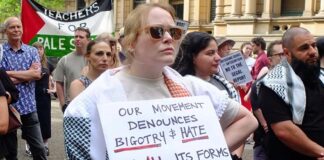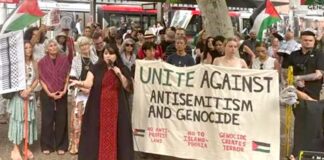In January Israelis re-elected Prime Minister Benjamin Netanyahu and gave unprecedented seats to far right settler parties. They now control a third of the Israeli parliament, the Knesset.
Their policies include revoking citizenship for Palestinian Israelis and annexing large sections of the West Bank. During the campaign, one candidate even asked Israelis to imagine blowing up the Dome of the Rock, a famous Muslim shrine, and replacing it with a Jewish Temple.
Netanyahu’s coalition with ultra-nationalist Avigdor Lieberman, the Likud-Beiteynu party, secured the largest bloc with 31 seats. Likud stated it was proud of its last four years in power, including its belligerance on Iran and the fence it built on the Egyptian border to keep out African refugees.

The so-called “centre” Yesh Atid party has the second largest bloc with 19 seats. Israeli and Western media commentators have claimed this may pull Israel off its right-wing trajectory, because Netanyahu may need to form a coalition with Yesh Atid.
But Yesh Atid leader Yair Lapid has openly stated he doesn’t think Arabs are interested in peace, that he wants to build a “tall fence” between Israel and the Arab world, and that full control of Jerusalem is not up for discussion. Showing his deep commitment to the ongoing occupation, Lapid launched his election campaign at Ariel, the first Israeli settler university built in the West Bank. Lapid has also ruled out any alliance with the Palestinian parties, who won just one tenth of Knesset seats.
Only a month in to his new term Netanyahu launched an airstrike on Syria, and has just approved 90 new settler homes.
The new Knesset will be just as committed as the previous one to expanding settlements on Palestinian land, maintaining belligerance to Iran, and holding back the Arab Spring.
Israel’s elections are based on the exclusion of Palestinians—4.3 million Palestinians live under Israeli military occupation, yet are denied the right to vote. The results confirm the rightward trend in Israeli politics and shows that real change for Palestinians won’t come from inside Israel.
Solidarity





